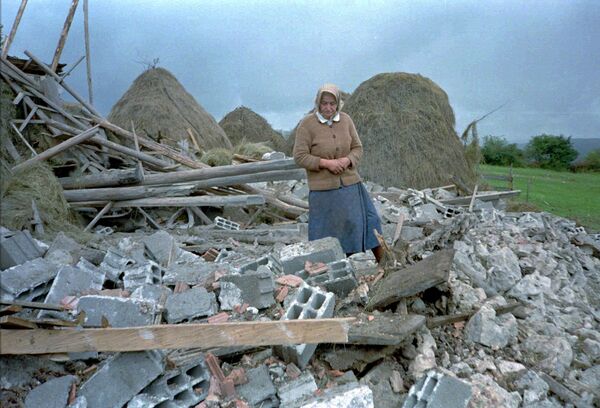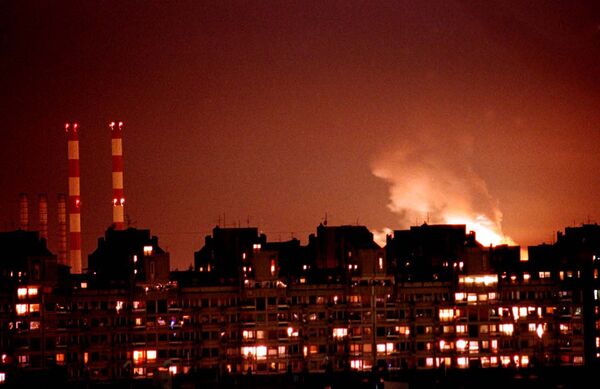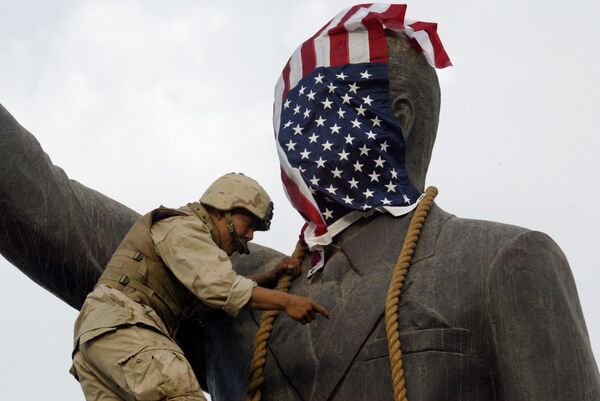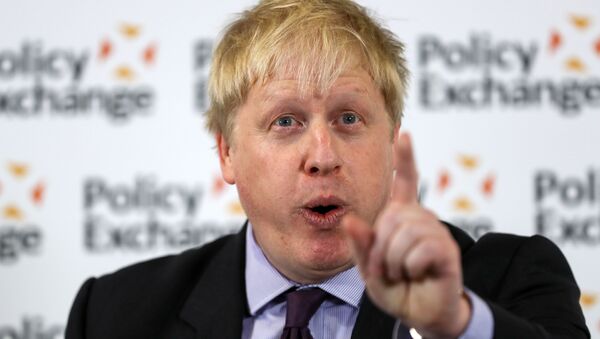Johnson’s despatches from Belgrade in the spring of 1999 were published in the Daily Telegraph and make interesting reading twenty years on. You can hardly accuse him of peddling neocon propaganda.
Johnson called the assault on Yugoslavia, which lacked UNSC authorisation, ‘a miserable war’.
‘War is stupid. War is hell. But never has there been a war so stupendously incompetent in matching methods to aims’ he declared.

Unlike others, he didn’t attempt to whitewash NATO’s actions. ‘NATO succeeded in decapitating a priest as he crossed a bridge in broad daylight on the feast of the Holy Trinity. They killed a toddler as she sat on her potty. Of course, this was not intentional, in the sense that some brasshat at Mons did not target this priest of that toddler. But you could say that it was intentional in that NATO dropped bombs from 15,000 feet in the sure-fire knowledge that civilians would be killed.’
Johnson finished that particular article by saying that if there was to be a NATO ‘victory parade’ at the end of the war, he hoped there would be a man behind Clinton and Blair in their chariot to whisper in their ears ‘not only of their own mortality but also of the mortality of the people they claimed to be protecting’.

While condemning violence from Serbian paramilitaries against Kosovan Albanians, Johnson refused to indulge in Serbophobia, which was so fashionable in western circles in the 1990s. ‘Call me a dupe, but I seem to like most of the Serbs I have met, and feel sorry for them’ he wrote in an article entitled ‘The Serbs will blame us and they will have a point‘.
The war against Yugoslavia was of course prosecuted by a Labour government in Britain, so perhaps Johnson’s strong criticism of the way it was waged can be seen (at least in part) as party politicking.
But it would have been hard for Johnson, based in Belgrade, to have seen the things he saw and not been affected. ‘It was particularly sad, walking up a suburban street, where dead and injured were being taken to see the collateral damage. It was particularly sad, walking up a suburban street, where dead and injured were being taken out of their houses. I felt a surge of anger that my taxpayer’s money was being used to fund this destruction, and I am afraid that pathetically, in a mumbled way, I apologised. It is difficult to be in an ancient European capital, under bombing and not to oppose the bombardment’, he wrote.
Yet just a few years later Boris had changed his tune. I remember asking him at a party of a mutual friend, just a few days before the illegal invasion of Iraq in 2003, whether he believed the guff about Saddam Hussein having Weapons of Mass Destruction which could be assembled and launched within 45 minutes. Johnson looked at me, paused and then replied: ’You’ve got to admit Saddam is not a frightfully nice chap’.

Writing in the foreword of his 2006 book ’Have I Got Views for You’, Johnson said that in relation to his war reporting from Belgrade: ’I think, in retrospect, that I failed to see the wood for the trees; and that has made me approach the second Gulf War with a more open mind’. He went on ‘You can say what you like about Blair. But he has participated in the toppling of two tyrants, Milosevic and Saddam, whom (John) Major had left in power‘.
Johnson also lauded Tony Blair for forming as close a link with a right-wing Republican President George W. Bush, as he had done with a Democrat, Bill Clinton.
The man who had declared ‘War is stupid. War is hell’ in 1999, had come to accept Blair’s military interventions. Yet that still didn’t stop him saying in 2014 that someone who had called for Tony Blair to be imprisoned over the Iraq War had ‘his heart in the right place’.
That same year Johnson said that Blair’s argument that the violent insurgency sweeping Iraq had nothing to do with the 2003 invasion was ‘unhinged’.
Fast forward to March 2016 and Johnson having served two terms as Mayor of London, is writing in the Daily Telegraph about Syria. It’s as if the old Belgrade Boris has come back to life. In a column entitled: ‘Bravo for Assad- he is a vile tyrant but he has saved Palmyra from ISIL‘, Johnson said he couldn’t conceal his ‘elation’ as the Syrian Arab Army recaptured the ancient city from the terrorists.
The piece followed on from another in which Johnson had argued for a WW2-style Grand Alliance with Britain, the US, Syria and Russia coming together to defeat said, terrorists.
These articles would only have increased fears in the neocon establishment, centred around the Rupert Murdoch media empire, that Johnson was not a ‘true believer’ in regime-change projects and may have helped sabotage his leadership campaign in 2016, as I argued here.
But as soon as Johnson became Foreign Secretary he flip-flopped again. He went from ‘Bravo to Assad‘ to ‘Assad must go‘ in a matter of months, performing a similar U-turn to the one he had done in relation to the war against Yugoslavia.
All the evidence shows us that Boris Johnson, like Donald Trump, is not by instinct a warmonger, or an obsessed ‘regime-changer’, but will go along to get along. Reporting from post-invasion Iraq in 2003 Johnson made a most revealing admission. ‘I wrote, spoke and voted for the war, and was hugely relieved when we won. But owing, no doubt, to some defect in my character, I found it very hard to be gung-ho'.
Doesn’t it tell us plenty about the political space in which Johnson operates that he sees not being ‘gung -ho’ as a character defect?
Follow Neil Clark @NeilClark66 and @MightyMagyar
Support his AntiStalker Crowdfund Appeal
The views and opinions expressed in this article are solely those of the author and do not necessarily reflect those of Sputnik.




